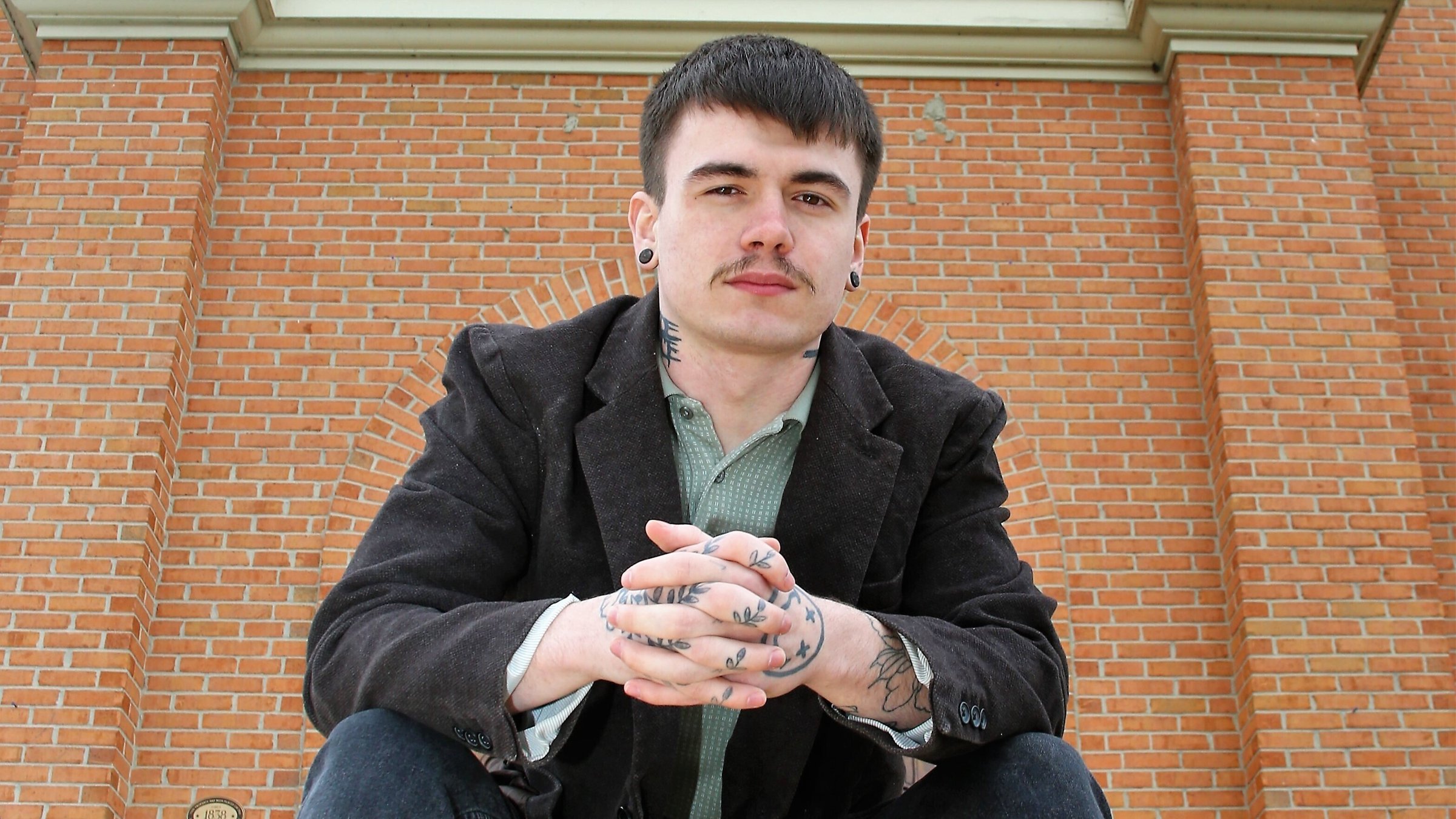From a childhood of drug abuse, violence and despair, Monroe man discovers God's mercy: Jesus 'pulled me out of my grave'
Editor's note: This story contains graphic details some readers might find upsetting. Discretion is advised.
MONROE — The tattoos covering much of Trent Vecchiarino’s body point to the incredibly broken journey he’s already traveled. They also speak to the hope-filled future of his new life in Christ.
In fact, many of the 21-year-old’s tattoos have now taken on multiple meanings, especially in the last couple of years.
On the left side of his neck are three crosses, somewhat resembling the scene on Good Friday. “The three crosses here are for three close friends who have died tragic deaths. One was murdered due to gang violence, another died at age 13 of cancer, and the last one was struck by a car crossing a street,” Vecchiarino glumly indicated.
On the other side, written in spunky font are the words “Suicide Silence,” seemingly alluding back to the five suicide attempts — one of which led to his brief death — that Vecchiarino survived. However, the young Monroe man noted it was the name of a heavy metal band he used to listen to during his earlier years of rage. “Definitely not a very Christian band,” Trent admitted.
Vecchiarino pointed out a small flower on his right hand, somewhat shrouded by leafy vines covering portions of his fist.
“This rose wasn’t here before. It’s covering up three dots, each representing three attacks I made while in prison,” Vecchiarino shared. “It was a sign I had earned a higher ranking within the system.”

He then mentioned an unfinished tattoo covering almost the entirety of his back. It’s of Azrael, the so-called angel of death that is referenced in some Islamic and Christian texts. For much of Vecchiarino’s young life, death seemed to be stalking him. He thought it would be fitting to place the image on his back during his teenage years.
Fast forward just a few years and Vecchiarino now finds himself just a few days away from receiving the sacraments of baptism, confirmation and the Eucharist this Easter vigil at St. Mary of the Immaculate Conception Parish in Monroe. He no longer feels the need to have that tattoo completed.
“Death is truly behind me now — I didn’t color it in because it will not take me over,” Vecchiarino proclaimed. “God has given me new life.”
An early life of suffering
Trent Vecchiarino was born into “broke, extreme poverty” with his mom and siblings in Rhode Island. His father essentially abandoned his family when he was young. “Throughout my childhood, we had my mom’s boyfriends living with us, and it wasn’t a good situation.”
His earliest memory portended a challenging life ahead.
“I must have been three — my mom and us were living with this 40-year-old man, and we had to go to the bus stop to pick him up," Vecchiarino related. “He was fighting in a bar with other drunks and he was beaten bloody. We picked him up and took him down to the basement of our home. I remember helping wipe the blood off his face with a bowl of water and a rag. All of a sudden, my mom and the boyfriend start screaming at each other. He runs upstairs. I then took the bowl of water and poured it out in the sink downstairs. The next moment, I decided to play with my toy bus in the same spot where I was cleaning up the blood.”
For much of his adolescent years, Trent possessed a negative impression of God, reinforced by his early family experiences. He remembers constantly moving, evicted on an almost annual basis from houses they were renting. Many of his siblings were actually half-siblings, and favoritism toward certain ones created a somewhat segregated home. In addition, a constant cycle of live-in boyfriends treated his mother terribly, leading her to question God’s goodness. Her struggles with faith spread to her children.
“My mom literally told me that if God is real, we don’t like Him because He lets us suffer so much,” Vecchiarino recalled.
Trent does remember a moment from his childhood that piqued his interest in going to church. While with his “sort of step-grandmother” in Massachusetts, he went with her to Mass one Sunday. Whether or not it was his imagination, he remembers “seeing Jesus talk to me.” When it was time for Communion, he was escorted up to the foot of the altar where the priest blessed him. “I wanted to eat the paper,” Vecchiarino chuckled, referring to the reception of the Eucharist.
Around the age of 8, his family moved to Monroe to live with his aunt. During his first year at the local elementary school, he decided to simply walk home while class was still in session. That prompted an all-out search for him in the community, which included helicopters scouring the area. “I thought it was funny at the time,” Vecchiarino noted.
A year later, his mom’s boyfriend’s son persuaded Trent to attempt suicide for the first time. The 11-year-old kid approached him in his bedroom, asserting, “Life is just worthless, everything we’ve been through proves it … I don’t want to be here any more. Are you with me, brother?” Trent agreed, and they swallowed an entire bottle of aspirin together. Trent’s mom rushed the two boys to the hospital, where they had their stomachs pumped.
Right around that same time, Trent began smoking cigarettes. A year later, he started using marijuana with older neighborhood friends, falling quickly into a subculture of drug abuse.
It almost took his life at age 11.
He and his buddies thought it would be a good idea to head up to the Greenfield neighborhood in northwest Detroit and see if they could get their hands on psilocybin mushrooms. Trent and his friends were at a bus stop when someone in a hoodie haphazardly started firing a .22 at them, apparently trying to kill one of his drug-dealing friends. The boys quickly jumped into their truck and sped off for Monroe County. While on the ride back, Trent was experiencing a sharp pain in his hip. Sure enough, a bullet was lodged just beneath the skin with half of it sticking out. Once they arrived at his oldest buddy’s house, the 17-year-old poured vodka straight into Trent’s wound, made him sip it as well and quickly pulled out the bullet. He proceeded to stitch Trent up with a household needle and thread. Trent would tell his mom it was just a bad scrape from falling off his bike.
Just a few months later, he learned his family was moving again, this time to Arizona.
“I was very upset at the time,” Vecchiarino shared. “The guys I was hanging out with were more family than my own family.”
An 11-year-old Trent immediately found himself in more serious trouble in his new hometown of Mesa, Arizona. “My Arizona friends and I called the area we lived in the ‘Valley of Death,’ gang shootings every week,” Vecchiarino bluntly stated. “We also called it ‘Zombie Land’ with the number of drug addicts tweaked out everywhere on the streets.”
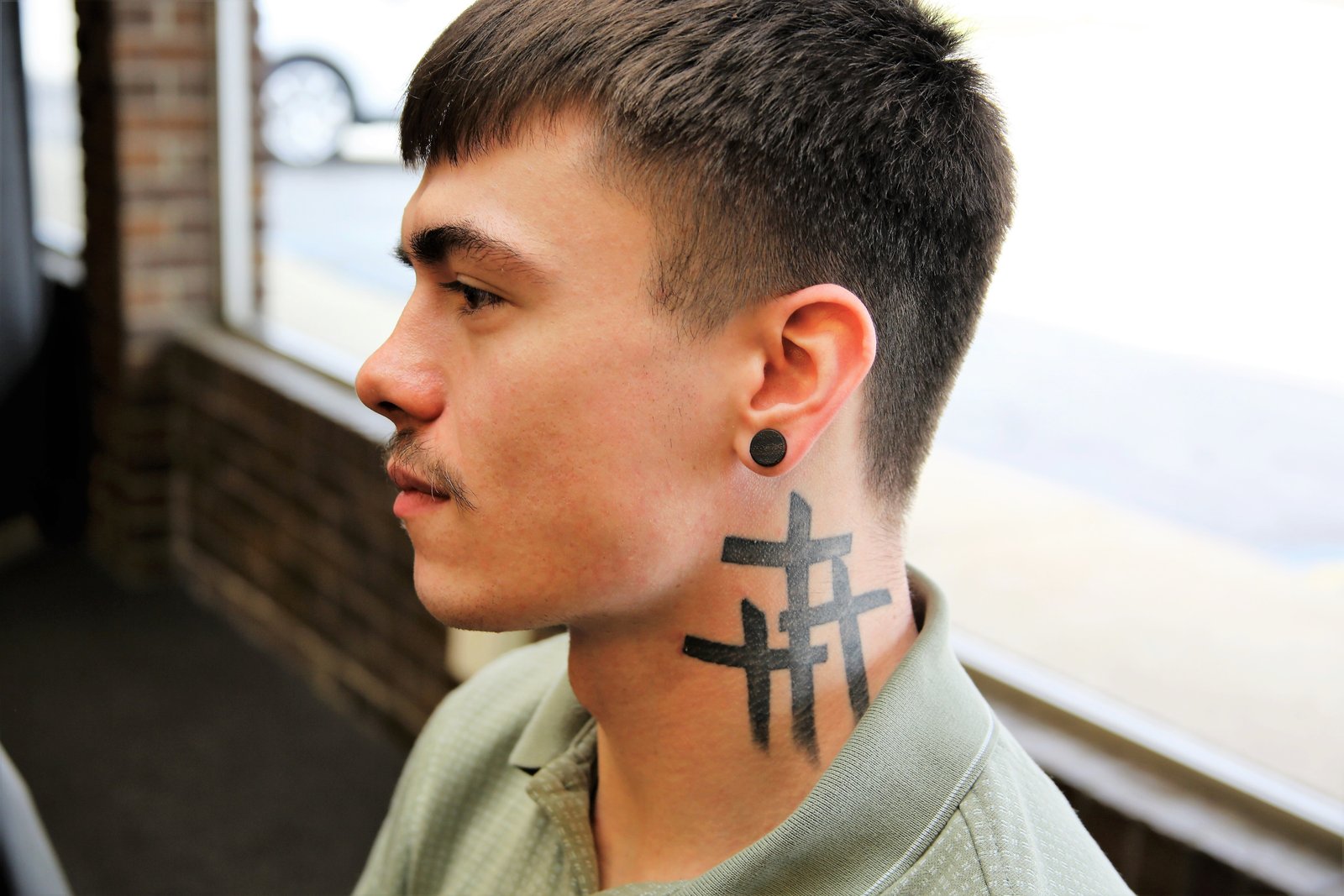
Two weeks after the move, Trent found himself in a drug dealer’s home to pick up marijuana. At one of the tables in the house was an older man snorting lines of cocaine. The man invited the adolescent to join him. With that hit, Trent began his descent into harder drugs, self-harm, and hurting others.
Trent quickly acquired a new group of drug-using friends, mostly other teens from broken homes throughout the Mesa area. He began to use methamphetamine, which spiraled out of control and led to physical fights with his mother. He also started to cut himself.
“It was a way of expressing my anger, my self-hatred, and really just hatred for life,” Vecchiarino explained.
Falling into a subculture of abuse
The cutting forced him into a local behavioral center. Trent quickly sensed the adults at the facility really didn’t care about his improvement. Instead, doctors prescribed him mountains of antidepressants and the staff members were abusive, he said.
Behind the backs of the staff, Trent and three other patients — one female and two other males — devised a plan to break out. They would smash through the back door when the facility would least expect it and escape. Their first attempt failed miserably, but the next day the quartet tried again. Swinging a chair as hard as they could, the door burst open with ease. They booked it out of the facility and into the surrounding desert with the sound of police sirens echoing in the distance.
Trent and his new friends hitchhiked to East Mesa. Standing outside of a run-down hotel, a man approached them and boldly stated, “If you find me a bird (prostitute), I will give you some G-funk (meth).” Almost immediately, the man handed them a piece of tinfoil and meth to smoke.
After a few hours around the hotel, a female prostitute staying there invited the young boys into her room. Trent remembered, “As soon as we walked into the door, there’s a mountain of meth on the bed.” Together, they proceed to smoke again.
While it felt like just days, Trent and the others ended up staying in the hotel room for almost an entire month. When his friends finally left, Trent stayed behind, and the prostitute began to seduce the 12-year-old boy. He lost his virginity.
During this time, the woman also introduced Trent to intravenous drugs. She obtained syringes and encouraged Trent to try it out. As Trent was getting higher and higher, the woman became more physically and sexually abusive toward him.
“I was definitely taken advantage of, stripped of my innocence” Vecchiarino soberly recalled.
A month later, Trent left the hotel room, and after meeting a series of people who counseled him, agreed to return home to West Mesa. Because of the incessant drug use, neglect of his appearance, and the abuse he sufferd at the hands of the prostitute, his friends and even his mother had a hard time recognizing him at first. His mother called the police, and he was placed in a Phoenix hospital to safely withdraw from his heavy meth use.
His own body and mind were seemingly going to war with him.
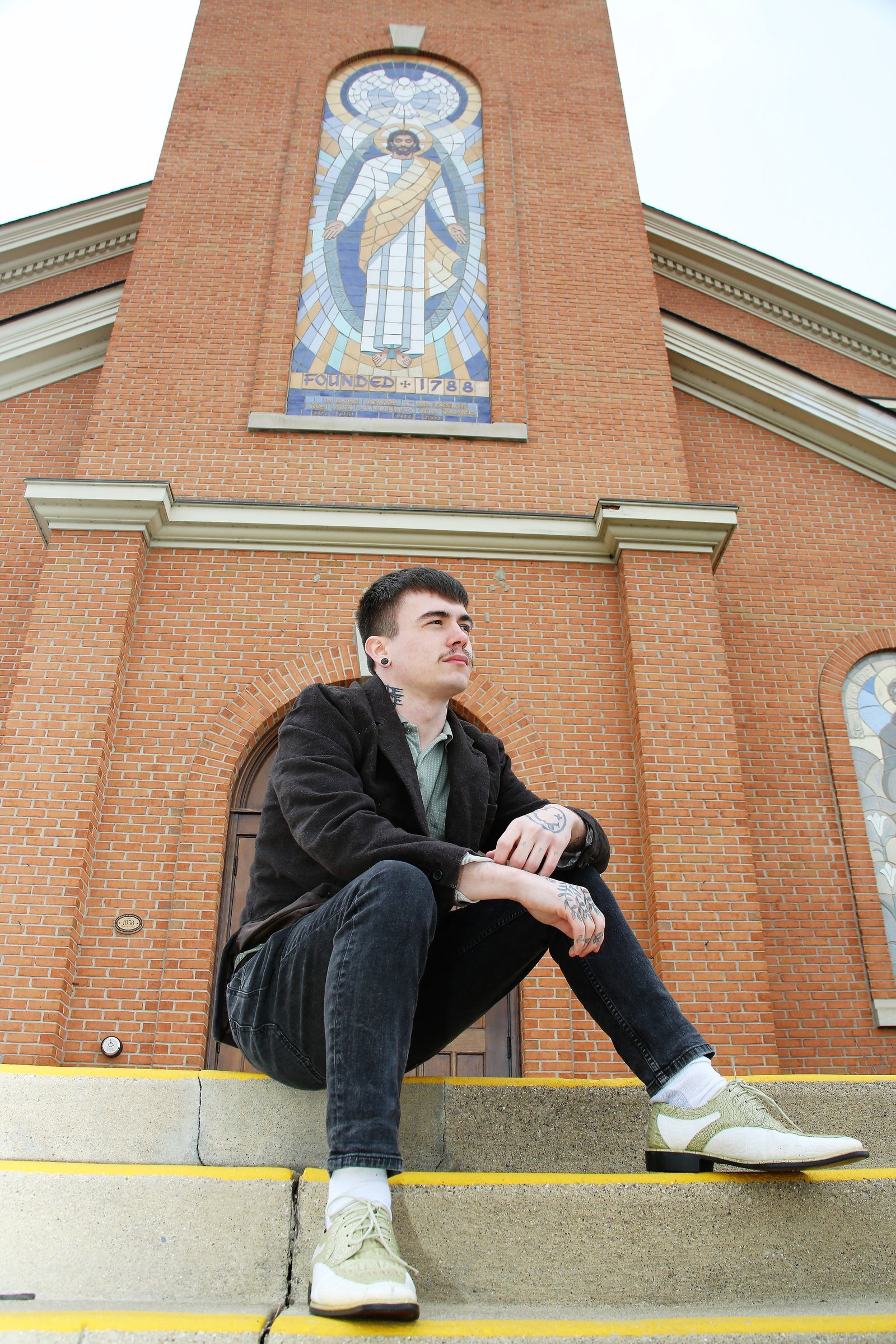
“I remember laying in bed for a week and half straight, just shaking violently for hours. Every joint in my body was shaking,” Vecchiarino recalled. “All the while I was hallucinating. Seeing demons and scorpions trying to attack me.”
After a month, he returned home. Vecchiarino remembers it as a time in which he was devoid of emotions and feelings. For his safety, his mother removed his bedroom door and everything that wasn't essential. Trent had to check in even to use the bathroom. Still, Trent managed to sneak out his bedroom window at night, meeting up with friends, and jumpstarting his drug habit again.
It was during this period that Trent made his second attempt to take his own life. He had received a text earlier in the day from a Monroe girl he still had feelings for that devastated him. It was “icing on the cake,” he recalled.
In the middle of the night, Trent tried to hang himself in his bedroom closet. Just as he was slipping out of consciousness, his mother entered the room and discovered her son. She immediately called 911 and the police, and seven officers arrived. They began chest compressions, using a defibrillator to try to save the 12-year-old’s life. The next thing Trent remembered, a flickering light was darting in and out of his eye, and a man kept repeating “yeah” over and over. It was a police officer using a flashlight to get some indicator of life.
He woke up in a hospital.
Arrested and sentenced
Trent was subsequently sent to a long-term rehabilitation facility in Scottsdale, and despite making progress, his insurance ran out after three months. He left rehab, despite his therapist's insistence he wasn't ready.
Over the next several months, Trent made three more suicide attempts. He was in and out of rehab facilities and battled anger issues, even being placed on probation for tearing one of the facilities’ water fountains off the wall. When he was not in rehab, he was causing mischief in local schools, getting suspended and eventually expelled — a violation of his probation — and he was placed in a juvenile delinquent facility, where he began to cause fights with other youths.
On Feb. 3, 2016, living at home once again, Trent's troubles with the law took a more serious turn.
His mother had become increasingly strict, monitoring his every move and once again taking the bedroom door off the hinges. Earlier in the day, Trent and his mother had a heated argument. Fed up, he snuck out of the house and met up with a friend, obtained meth and a syringe, and shot up in a hotel courtyard.
Returning home, he crawled through his bedroom window only to find his mother waiting for him. As she questioned him, Trent went ballistic. Under a meth-induced haze, he threatened to kill her, and as she grabbed her phone to call his case worker and the local police department, he stormed out the front door and into the darkened streets of West Mesa.
A little ways down the road, a patrol car pulled up alongside Trent. Two cops exited the vehicle, one staying closer to the car and another slowly approaching the rage-filled 13-year-old.
“Don’t make this harder than it has to be,” the police officer asserted.
Trent immediately made it harder by punching the officer in the face. The officer went into combat mode and attempted to take the teenager to the ground. After a bit of scuffling, the officer established a position on top of him. Trent reached for the officer’s gun and successfully took it from his holster. Just as he put his finger to the trigger, the officer removed the slide portion of the gun and disabled the lethal weapon. The officer hammer punched the gun-wielding teen, and Trent dropped the gun. He was handcuffed and placed in the backseat of the car.
After a brief stay in a hospital handcuffed to a bed, Trent was taken to a teen detention center. A year later, his sentence came in: two years for assaulting, intimidating and threatening a police officer. By age 14, Trent would become the youngest in the Adobe Mountain prison located in north Maricopa County.
Trent had to adjust quickly to the prison's culture.
“Prison culture is built on respect. If you are disrespectful you can have serious problems,” Vecchiarino said. “And you have to know how to be violent when necessary … you’re always on edge.”
His unit typically had two inmates in a cell, but since Trent was so young, he was given his own. Admittedly, he enjoyed the constant structure and lack of technology. Other perks included the fact he could take classes at the adjacent Adobe Mountain School, an educational facility for detained adolescents and teens.
“The food there was really good, and you had more freedom to do what you want. You could actually play basketball,” Vecchiarino remembered.
Still, the majority of his time in prison — up to 20 hours a day — was spent isolated in his cell. He passed the time by reading and talking to inmates in neighboring cells through vents. Though Trent didn't enjoy books during his childhood, he learned to love them in detention.
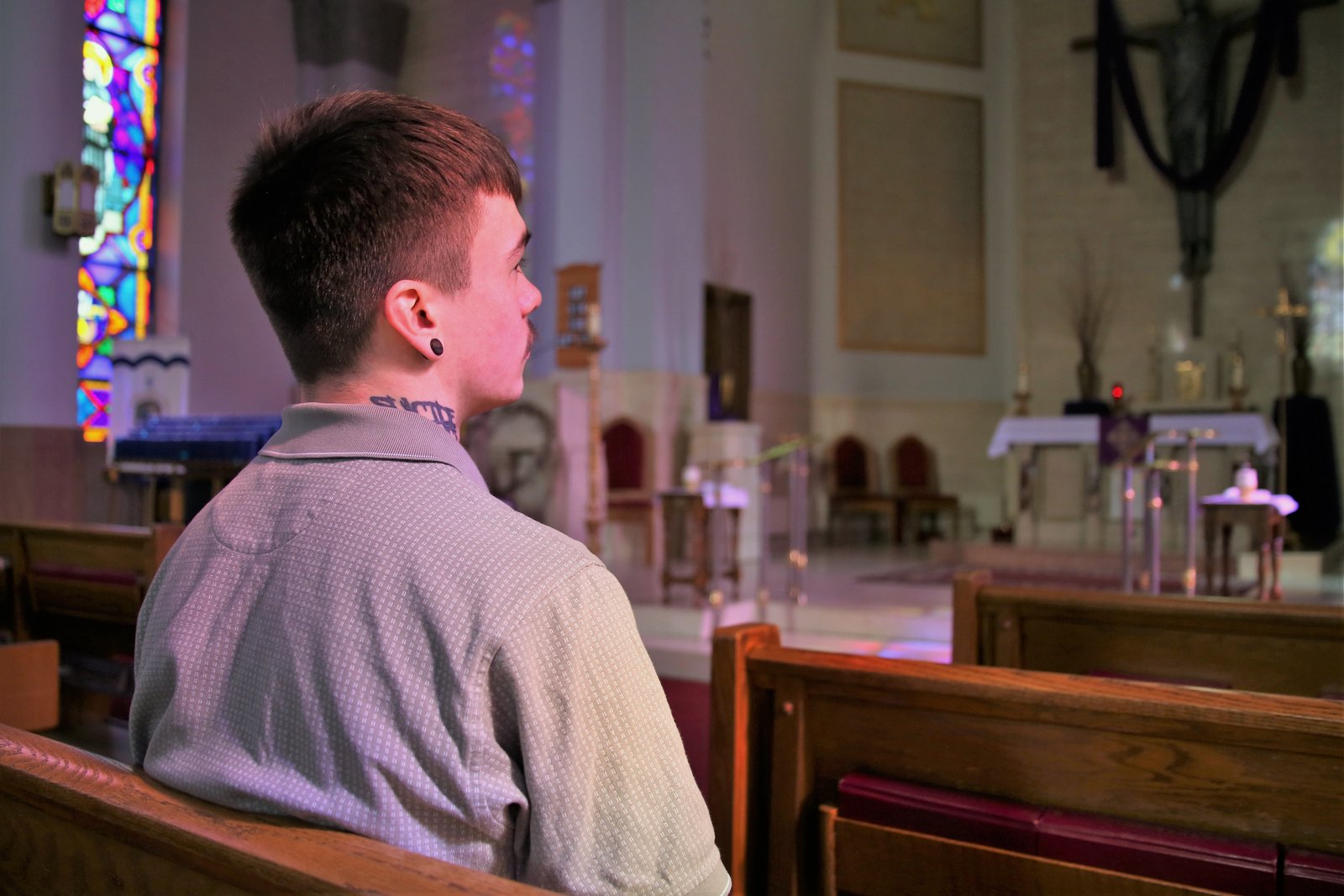
He preferred fantasy and science fiction — "Through the Looking Glass" and "Fablehaven" were two of his favorites. Surprisingly, he also enjoyed "The Diary of Anne Frank."
“It was so relatable to me at that time," Vecchiarino shared, "being confined at a young age by four walls and having no sense of freedom — fearing that I might not have a future.”
Introduced to the Gospel
Although he was allowed to read the Bible, it didn't click for him initially. Trent remembers trying to read it, but it seemed to him “just a boring history book.” Still, it had its uses. In his unit, pillows were not permitted in the cells, so most nights he would open it and fall asleep on its thick pages.
Among Trent's friends in prison was a 21-year-old man named Larkin, who had arrived just a month before Trent and was serving a seven-year sentence for armed robbery. “We were brothers,” Vecchiarino recalled, always together when they had recreational time, playing cards and dominoes. At one point, their cells were positioned right next to each other and they talked through the vent system for about three months straight.
Given Trent's small stature, Larkin taught Trent how to stand up for himself in prison — to fight if necessary — and it didn't take long for that to happen. One day, a larger inmate threatened him, and during leisure time, Trent broke the man's teeth with an uppercut to the jaw. He was placed in solitary confinement.
Brutal assaults like this one were a regular part of life behind bars.
“I watched a guy stab another guy just for two cookies,” Vecchiarino said. “I personally know how evil can completely overcome a human … I was a monster. I had no feelings, no remorse towards others. I was demonic and I’m glad I’m free of that now.”
The teenage inmate was indeed dabbling with witchcraft. His friend Larkin was a professed Wiccan and introduced Trent to chants, astral projection and inviting demons in as protectors. Before long, he began to see demons.
Unlike the rehab facilities, hospitals, and detention centers, various Christian denominations were active in the prison. But it wasn't the Bible studies, dynamic preaching, or even the people serving that attracted Trent.
“It was the cookies and time out of my cell that hooked me,” Vecchiarino laughingly admitted. “The Catholics were known for lemonade and the Pentecostals had the best cookies.”
He started attending various services and prayer groups, but at the beginning, Trent was not having any of it. He would sit skeptically, hang out with other inmates, and then eat desserts or snacks. One time, a female Catholic volunteer struck up a conversation with the teenager. Partially to shock her and partially to tell her the truth, Trent told her, “I’m not Christian, but Wiccan and I prefer to worship the devil.” The woman froze and simply walked away.
It wasn't long, however, before a Holy Spirit-infused moment changed the trajectory of Trent's life.
During one Pentecostal service, Vecchiarino remembered the long-haired pastors seemed strange and dramatic, often preaching while tears streamed down their faces. During the service, inmates were invited to approach the altar, prostrate themselves there, and ask for forgiveness. Trent complied, placed his face on the altar, and started to ask.
Suddenly, tears burst forth. One of the pastors laid his hand on Trent’s shoulder and encouraged him to continue his repentance. For the first time in his life, the teenager began to express true sorrow for all the wrong he had committed.
The 16-year-old immediately started to notice changes in his demeanor. No longer did he struggle with fits of rage or a desire to fight someone. He found himself enjoying time alone and silence. The last several months behind bars were filled primarily with peace.
But it wasn't the end of Trent's long road home.
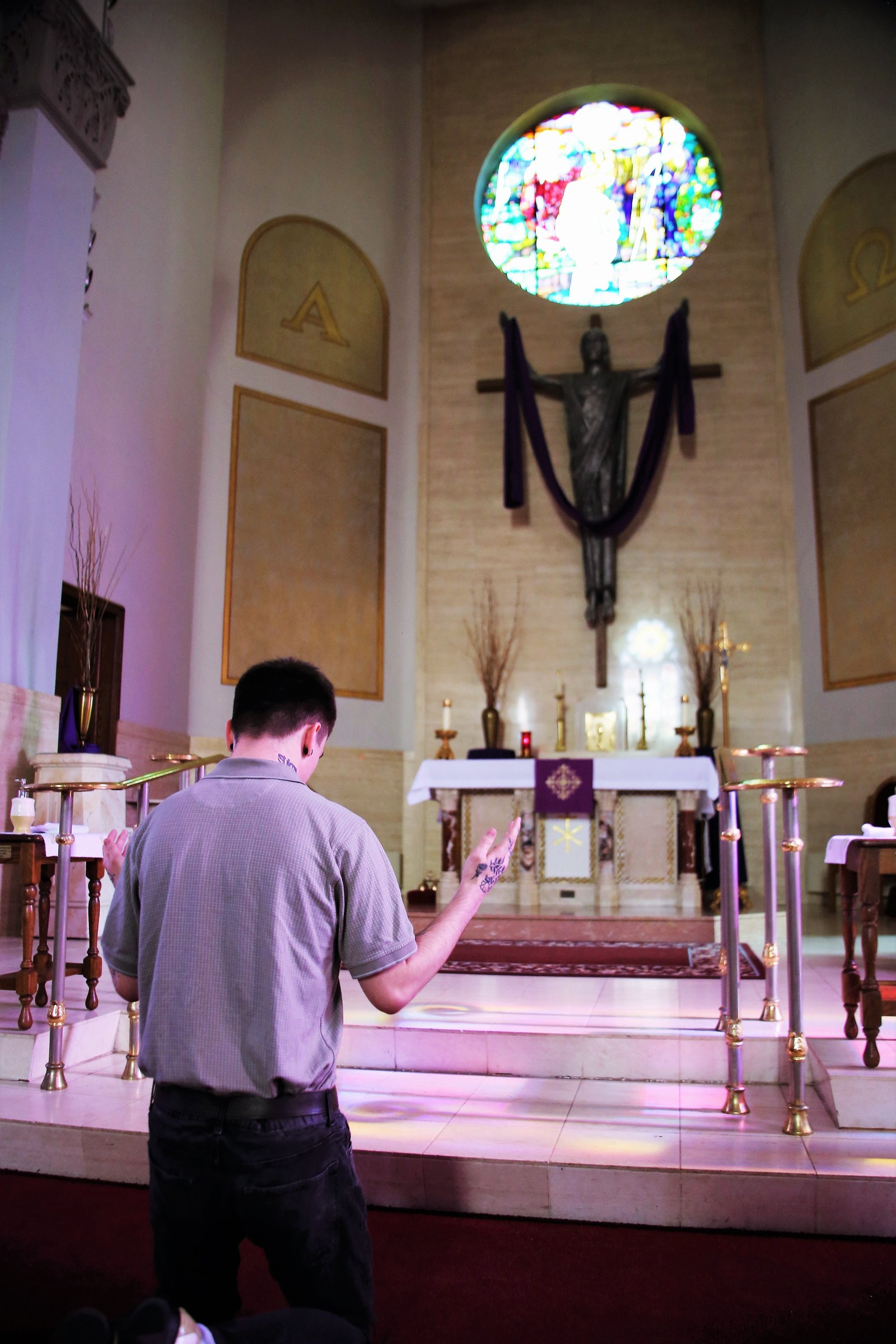
Returning to Michigan
Just two months before his release date, his case worker called for a meeting with Trent. “Your mom has moved back to Michigan,” the case worker relayed. “When you’re released, we have to fly you out there because you're under 18.”
While he didn't realize it at the time, it was a decision that probably saved his life.
“Reflecting back now, that decision to move back to Michigan ended up being everything,” Vecchiarino admitted. “I can legitimately say that at least 50 of my friends back in Mesa have since died tragic deaths … I probably would have died if I went back there.”
Vecchiarino was released from prison in May 2019. A corrections officer escorted him to the airport and stayed at the terminal gate until he boarded the Detroit-bound plane. Aboard the plane, Trent's seat was in the very last row against the window next to a large man with sunglasses: “Had to have been a Marshall,” Vecchiarino noted.
When the plane landed, Trent soon realized he had no idea how to navigate Detroit Metro Airport. It took two hours to find his way outside, but once he finally did, waiting with signs, tears, and hugs were his mom, his younger sister and few other relatives.
Life in Michigan and outside prison was somewhat surreal to him. “It seemed like a generation had passed me by,” Vecchiarino remembered.
Enrolling in Monroe Jefferson Public High School, Trent recalled noticing his classmates seemed normal and not aggressive at all. But he thought their worries were childish, complaining about petty relationships and needlessly concerned about what people thought of them. Meanwhile, he suffered from thoughts of worthlessness and struggled to find purpose.
Trent started to battle with flashbacks from traumatic childhood experiences, especially related to his time in Mesa. During really bad flashbacks, he would develop panic attacks, struggle to breathe and become hot to the touch.
“I still get them every once in a while, but I know how to deal with it now,” Vecchiarino acknowledged. “I just drop to my knees and ask for God to come to me. And He comes immediately, saves me from my destructive mindset.”
During his high school years, however, Trent didn't yet possess that spiritual mentality. Instead, he began to drink heavily, downing “shooters” of liquor before and during school. His teachers tried their best, but Trent simply didn't have the motivation for schoolwork. He slept through many of his classes.
Partially out of apathy and partially to help his mother cover the constant flow of bills coming in, Trent dropped out of school his senior year. He went to work for his girlfriend’s family, who owned a construction company. He spent most days doing laborious work, breaking up cement and hauling materials. During the winter, he found plenty of work plowing snow.
Making money like never before, Trent was funding his own alcoholism. The work culture encouraged drinking after work and many of his co-workers would buy for him despite being underage. “My drinking spiraled out of control,” Vecchiarino admitted. His relationship with his girlfriend soon ended.
'What does it mean to be a Catholic?'
Shortly after the breakup, Trent came across a social media post announcing open auditions for a local play. He always loved watching movies and actually honed his operatic voice during his prison years, often impressing inmates and staff members alike. Trent figured he would give it a shot.
Vecchiarino showed up to the audition in Monroe, but there was one major problem. The play was a Christmas themed show and he would be asked to sing Christmas songs. The 19-year-old honestly did not know any Christmas songs; he never was exposed to them at any length during his childhood or teenage years.
He tried to memorize “It’s Beginning to Look a Lot Like Christmas,” but at the audition he struggled mightily to recall the words. The directors allowed him to sing it with the lyrics pulled up. He ultimately landed a role, the first of many to come. Over the next few years, Trent acted in seven plays, made many new friends and even got a new girlfriend.
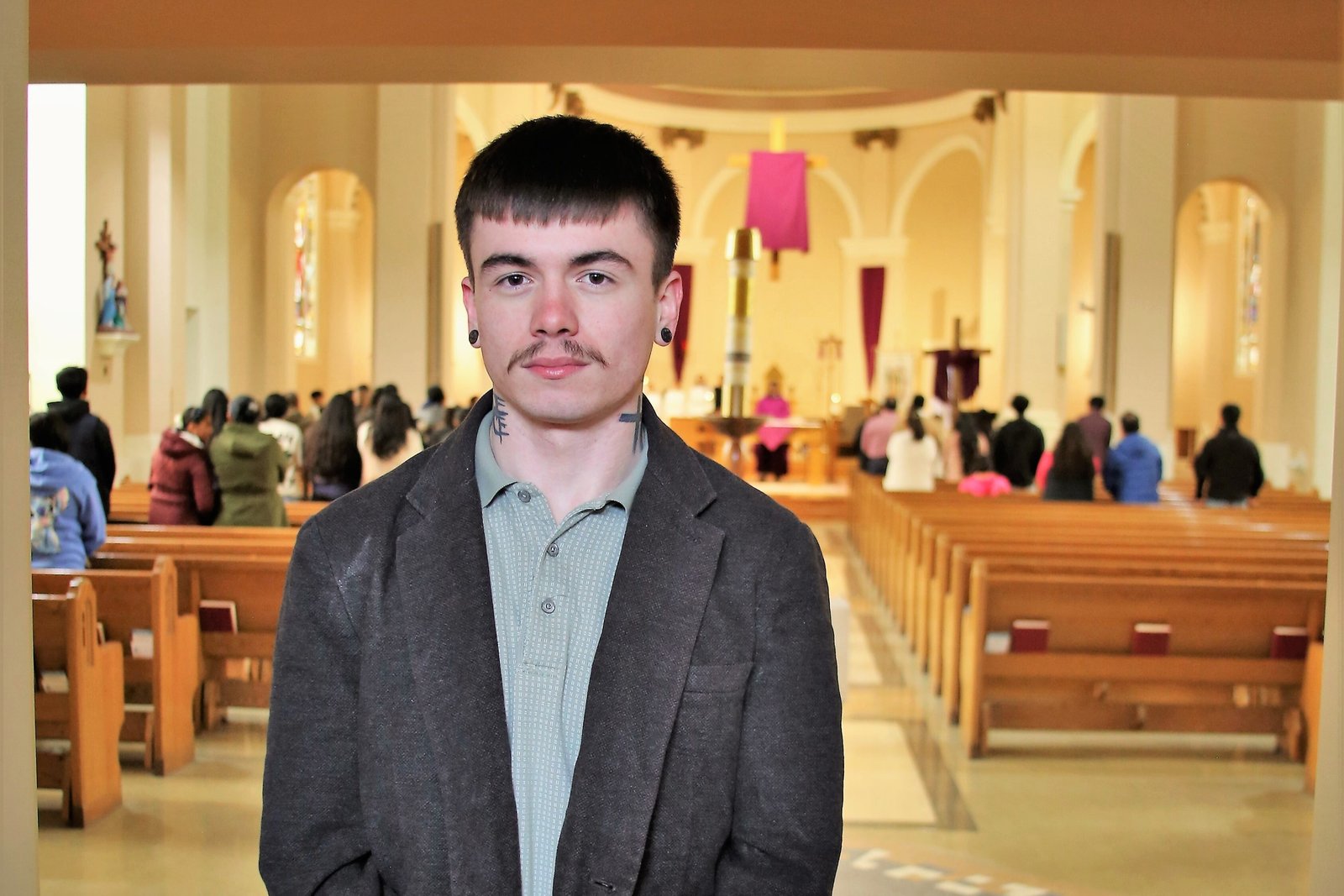
By early 2023, Trent found himself auditioning for "Beauty and the Beast." One of his friends was the assistant director, and many of his other theater friends were auditioning for the play. While he earned the role of Monsieur D’Arque, he expected another close friend to land the most important role, Belle.
To his surprise, a complete stranger came into the auditions exuding confidence. The woman, wearing what Trent recalled looked like a crown of lilies, proceeded to astonish with her instinctive talent and amazing voice, and was given the role of Belle.
The woman seemed to radiate joy in an almost supernatural way. She approached Trent, asking about the stories behind his many tattoos. Vulnerably, he shared his life story with the newcomer. She responded to his heart-wrenching testimony by praying over him.
Quickly, she and Trent became friends. Trent noticed on her social media profile that she was religious, vocally pro-life and involved in ministries related to the Catholic Church. One day, Vecchiarino asked her in text message, “What does it mean to be a Catholic?”
“She sent me a six-paragraph essay,” Vecchiarino laughed.
Trent's new friend recommended he pick up a Catechism, listen to a variety of podcasts, and watch a few video clips to become more familiar with the faith. She invited him to Mass at her local parish, St. Joseph in Maumee, Ohio, and Trent and another close friend took her up on the offer. When he entered the nave of the church, he experienced a feeling that reminded him of his emotions at the Pentecostal service in prison.
“But it was 10 times stronger, completely overcome and overwhelmed by the presence of the Holy Spirit,” Vecchiarino recalled. “God was telling me finally this is where I belonged … This is my home.”
She guided Trent and his friend through the “Catholic calisthenics” of the Mass, pointing out where certain readings, prayers and songs were located in the hymnal, and informing them to cross their arms to receive a blessing from the priest. Vecchiarino began to understand the source of his new friend's joy.
Over the phone, she and Trent would talk about God, formative life experiences, and prayer. She even joined Trent for Sunday Mass at St. Mary of the Immaculate Conception in his hometown of Monroe, introducing him afterward as a possible candidate for OCIA to the parish’s pastor, Fr. David Burgard.
A few weeks before "Beauty and the Beast" hit the stage, she introduced Trent to novenas. He started to research a powerful novena for the intercession of St. Therese of Lisieux and figured it was worth a try.
“I learned while doing the novena that the saints love to pray with us,” Vecchiarino affirmed. “I could feel St. Therese helping me to better discern and also bringing me closer to the Blessed Mother.”
Trent's girlfriend at the time, who grew up nondenominational, began to express concern about Trent's growing interest in the Catholic faith and his relationship with the woman. While Trent insisted they were just friends, he began to discern whether to end his relationship with his girlfriend.
In concluding the novena, he asked St. Therese to send him a white rose if they should break up. Just a few days later, on the final night of "Beauty and the Beast," a man walked up to Trent with a large bouquet of roses; the majority were red and purples roses, with just one white rose in the center. He handed him a single white rose. Vecchiarino was astounded.
A few days later, he and his girlfriend amicably ended their relationship.
Following the winding road home
Despite that seemingly miraculous intervention, and his newfound faith, Trent continued to struggle.
The play he rehearsed for night and day was over. Most of his theater friends were no longer talking to him. He had just broken up with his girlfriend. And his new friend was leaving for Scotland, to serve as a Catholic missionary.
Gripped by all this loss, Vecchiarino fell back into his drinking habit. His remaining friends in Monroe put up healthy boundaries and sent clear signals that his self-destructive behavior was problematic.
“Throughout this whole time telling God I’m sorry, knowing I’m going to go back to drinking,” Vecchiarino confessed.
The difference was, this time it wouldn't get the better of him. Trent worked up the courage to go back to church at St. Mary’s in late June of 2023. After the conclusion of Mass, Vecchiarino vividly remembers Fr. Burgard's reaction when he laid eyes upon the wayward young adult.
“He literally jumped for joy and shouted ‘Trent, oh my goodness!’" Vecchiarino shared. "It made a huge impression on me that he would remember me in that way.”
Trent soon began meeting with Fr. Burgard and Deacon Mike Stewart on a consistent basis. Soon after, he joined OCIA class in the fall of 2023. He also played a seminal role in Monroe’s recent running of ACTS XXIX’s "The Rescue Project," a program emphasizing the simple, saving power of the Gospel. Vecchiarino shared a shortened version of his testimony at the Rescue Retreat, prompting hundreds of participants to hold back tears and spurring an impromptu standing ovation.
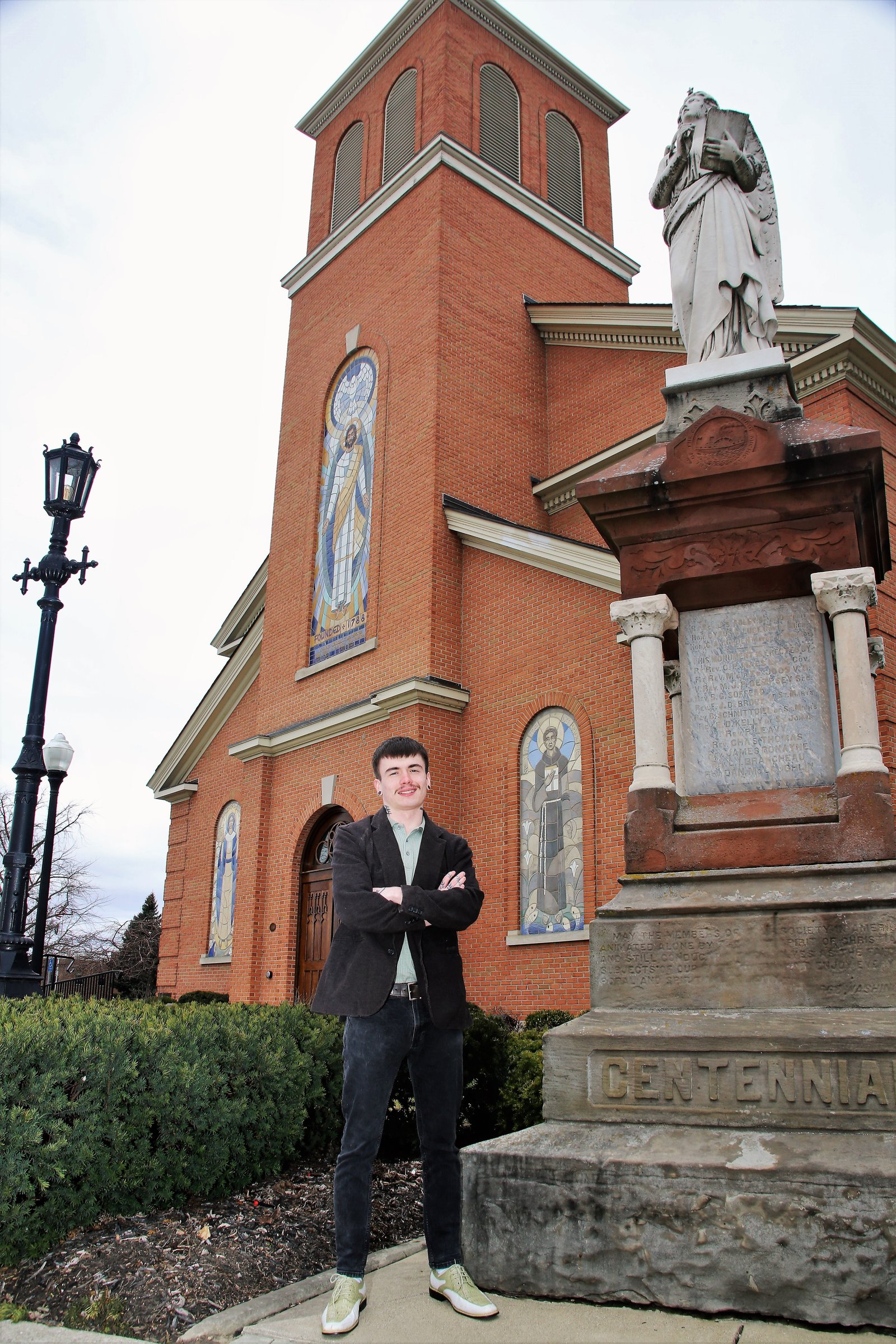
He has since fallen in love with Monroe’s Catholic community.
“I can be vulnerable, and I already feel like it’s home,” proclaimed the 21-year-old. “I’ve never met a group of people more accepting and loving … It’s truly Christ’s Church, and it possesses so much power.”
With just a few days before the Easter vigil, Trent Vecchiarino is overflowing with excitement, boundless hope and gratitude to God. For his confirmation saint, he is choosing Detroit’s very own Blessed Solanus Casey after a moving visit to his tomb. Trent is especially looking forward to being baptized, freed from all his sins and receiving Jesus in the Blessed Sacrament for the first time.
Vecchiarino knows life will still have its struggles, but for the first time, he's seeing his purpose, clear-eyed and armed with the love of Christ.
For Trent, it's the start of a new journey with a community of faith that's given him what's been missing: Jesus.
“He’s my best friend and my Lord,” Vecchiarino confessed. “He just loves me so deeply. He has given me my purpose. He pulled me right out of my own grave.”
Joe Boggs is a freelance writer for Detroit Catholic.
Copy Permalink
Conversions

